|
|
|
Sort Order |
|
|
|
Items / Page
|
|
|
|
|
|
|
| Srl | Item |
| 1 |
ID:
133281
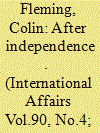

|
|
|
|
|
| Publication |
2014.
|
| Summary/Abstract |
The Scottish government's white paper on independence, Scotland's future, sets out its defence blueprint following a 'yes' vote. It makes clear that its defence plans would be subject to a Strategic Defence and Security Review in 2016, as well as negotiation on the division of assets with London. However, it also provides a strong indication of how it envisages its defence posture as an independent state-a major pillar of which is founded upon strong and continued defence cooperation with the rest of the United Kingdom. Is this a realistic assumption? And, if so, how would it work in practice? Contextualized by the increased emphasis on defence cooperation which sits at the heart of NATO's Smart Defence initiative, as well as the European Defence Agency's 'pooling and sharing' programme, the article assesses the benefits and challenges that might be encountered in a defence cooperation agreement between an independent Scotland and the rest of the United Kingdom in the event of a 'yes' vote in September's referendum.
|
|
|
|
|
|
|
|
|
|
|
|
|
|
|
|
| 2 |
ID:
130962
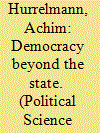

|
|
|
|
|
| Publication |
2014.
|
| Summary/Abstract |
MODERN DEMOCRACY IS, ABOVE ALL ELSE, a procedural ideal. To be sure, high substantive hopes are often placed in democracy. Yet the essence of democracy lies not in the specific outcomes that it may (or may not) help reach, but in a set of procedures that ensure, in the words of Philippe Schmitter and Terry Karl, that "rulers are held accountable for their actions in the public realm by citizens," who act primarily "through the competition and cooperation of their elected representatives."1 Historically, the main political arena in which democratic procedures have been implemented, and the main reference point for democratic theory, has been the state. According to a well-established argument, the democratization of non-state entities-such as international and supranational organizations or transnational networks with various degrees of institutionalization-is therefore faced with significant conceptual and practical challenges.2 This article seeks to assess the severity of these challenges: Can democratic procedures be transferred to political entities "beyond the state," or is democracy doomed to failure in non-state contexts?
|
|
|
|
|
|
|
|
|
|
|
|
|
|
|
|
| 3 |
ID:
092482
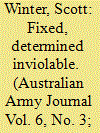

|
|
|
| 4 |
ID:
139189
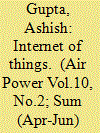

|
|
|
|
|
| Summary/Abstract |
Modern warfare has reached a strategic infection point in the wake of different geo-political challenge, global terrorism menace, different economic challenges, violence emanating from religious radicalisation and internal security challenges. Warfare is no longer the sum total of capabilities, of putting more personnel, capital and technology on the battlefield, but of better situational awareness, contextual knowledge, discerning disposition and homogenised action.
|
|
|
|
|
|
|
|
|
|
|
|
|
|
|
|
| 5 |
ID:
133824
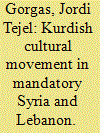

|
|
|
|
|
| Publication |
2014.
|
| Summary/Abstract |
In the late nineteenth and early twentieth centuries diverse, and sometimes competing, movements of cultural renaissance emerged in the Middle East. Within this context, the Kurdish cultural renaissance in the Kurmanji dialect appeared relatively late and moreover its fruits were curtailed by two major events: the First World War and the establishment of the Turkish republic. From 1923 onwards, the task of animating the Kurdish cultural renaissance fell on the Kurds exiled first in mandatory Syria and Lebanon and then in Europe. In exile, Kurdish intellectuals benefited from some advantageous conditions such as freedom of speech and organization. Yet Kurdish intellectual endeavors in the Levant were to face political, social and economic challenges. Using French records and Kurdish newspapers, this article explores both the opportunities and the constraints for the consolidation of the Kurdish cultural renaissance under colonial rule. In doing so, the article intends to enrich the debate on the formation of nationalisms in the interwar era on the one hand, and the relationship between colonial powers and minorities in the Middle East, on the other.
|
|
|
|
|
|
|
|
|
|
|
|
|
|
|
|
| 6 |
ID:
133262
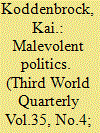

|
|
|
|
|
| Publication |
2014.
|
| Summary/Abstract |
Since the start of reporting during the 'Congo wars' in 1998 the International Crisis Group (icg) has been one of the most important sources of information for Western analysts, UN agencies and ngos dealing with the political and economic challenges of the Democratic Republic of Congo. This article takes a closer look at the way Congolese government politics is analysed in icg reports. It shows that the logics of government and the dilemmas of rule in a country with the size, geography and history of the DRC receive hardly any attention in icg reporting. Building on Klaus Schlichte's approach to the dilemmas of rule, the article argues that President Joseph Kabila has in fact responded skilfully to the dilemmas of elite inclusion across the different hubs of power and wealth from the Kivus to Katanga to the capital Kinshasa. While his political and human rights records are by no means impeccable, not all is rotten in the state of Congo, and the Kabila government deserves more analytical rigor and openness than is offered by the pathologising modes of analysis used by the icg.
|
|
|
|
|
|
|
|
|
|
|
|
|
|
|
|
| 7 |
ID:
133957
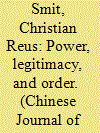

|
|
|
|
|
| Publication |
2014.
|
| Summary/Abstract |
Legitimacy is not something distinct from power; it is one of the vital sources of power. And if power shapes the nature and development of international orders, then the politics of legitimacy features prominently in the construction, maintenance, and dissolution of such orders. This article begins by exploring the concepts of power and legitimacy, their theoretical interconnection, and the impact that crises of legitimacy have on the maintenance of political power. It then takes an empirical turn, examining, however briefly, two sites in which the politics of legitimacy had a profound effect on the development of the modern international order. The first concerns the globalization of the system of sovereign states, a four-century long process of imperial extension, crisis, and fragmentation into successor states, a process in which struggles over individual rights played a key role. The second concerns the definition and distribution of special responsibilities for managing functional challenges among states. In orders characterized by formal sovereign equality, on the one hand, and imbalances of material capabilities, on the other, a mechanism needs to be found for containing and harnessing power to meet the problems faced by the international community. Historically, this has been achieved through the allocation of special responsibilities to particular states, usually great powers. But if regimes of special responsibilities create patterns of more or less formal hierarchy among states, they are also sites of intense battles over legitimacy.
|
|
|
|
|
|
|
|
|
|
|
|
|
|
|
|
| 8 |
ID:
128053
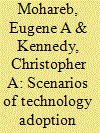

|
|
|
|
|
| Publication |
2014.
|
| Summary/Abstract |
Technological change has often been presented as a readily accepted means by which long-term greenhouse gas (GHG) emission reductions can be achieved. Cities are the future centers of economic growth, with the global population becoming predominantly urban; hence, increases or reductions of GHG emissions are tied to their energy strategies. This research examines the likelihood of a developed world city (the Greater Toronto Area) achieving an 80% reduction in GHG emissions through policy-enabled technological change.
Emissions are examined from 3 major sources: light duty passenger vehicles, residential buildings and commercial/institutional buildings. Logistic diffusion curves are applied for the adoption of alternative vehicle technologies, building retrofits and high performance new building construction. This research devises high, low and business-as-usual estimates of future technological adoption and finds that even aggressive scenarios are not sufficient to achieve an 80% reduction in GHG emissions by 2050. This further highlights the challenges faced in maintaining a relatively stable climate. Urban policy makers must consider that the longer the lag before this transition occurs, the greater the share of GHG emissions mitigation that must addressed through behavioural change in order to meet the 2050 target, which likely poses greater political challenges.
|
|
|
|
|
|
|
|
|
|
|
|
|
|
|
|
| 9 |
ID:
138051
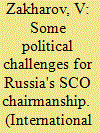

|
|
|
|
|
| Summary/Abstract |
IN MID-SEPTEMBER this year, Dushanbe hosted another summit of the member states of the Shanghai Cooperation Organization, which marked the starting point for Russia's chairmanship of it for the period 2014-2015.Scan the political and economic landscape in the SCO's area of responsibility and along its perimeter with an eye to the planned events schedule as well as the evolving explosive situation in Afghanistan and Ukraine. You can already assert that Russia's initiating and coordinating role in this period will be constantly affected by challenges like increasing political, military and social instability in the region and the world at large, the resurgent terrorist and narcotics threats, and continued attempts by extra-regional forces to gain a foothold and expand their presence in Central Asia.
|
|
|
|
|
|
|
|
|
|
|
|
|
|
|
|
| 10 |
ID:
124856
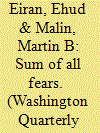

|
|
|
|
|
| Publication |
2013.
|
| Summary/Abstract |
Understanding Israel's framing of, and response to, the Iranian nuclear challenge should begin with an understanding of the four distinct forms of fear, and their contradictions, that help explain internal Israeli divisions over the response to Iran.
|
|
|
|
|
|
|
|
|
|
|
|
|
|
|
|
| 11 |
ID:
133958
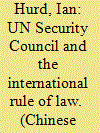

|
|
|
|
|
| Publication |
2014.
|
| Summary/Abstract |
This article considers the relationship between international law and the UN Security Council. The practical power of the Council is constituted at the intersection of its legal framing, its political legitimacy, and the interests of powerful states. This sometimes means the Council has less power than is assigned to it by the UN Charter, but it often means that it has more. It is clear that the Council sits within the international legal system, the legal limits on its action are interpreted in light of prior Council practice, and thus the meaning of 'compliance' and 'violation' of the Charter changes over time. Some transgressions of the Charter are understood as informal amendments to it; others are seen as threats to international peace and security that impel enforcement action. This ambiguity in the law and practice of the United Nations is inherent in the idea of the 'international rule of law'. The Council straddles the unstable boundary between international law and politics, both undermining and reinforcing the distinction between them.
|
|
|
|
|
|
|
|
|
|
|
|
|
|
|
|
| 12 |
ID:
133664
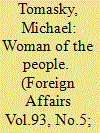

|
|
|
|
|
| Publication |
2014.
|
| Summary/Abstract |
Divisions among Democrats exist just like they do among Republicans, but have largely festered beneath the surface for lack of a spokesperson to challenge the party's economic elites. In Elizabeth Warren, grassroots Democrats may have found their champion.
|
|
|
|
|
|
|
|
|
|
|
|
|
|
|
|
|
|
|
|
|